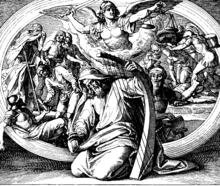Penitential Psalms
The Penitential Psalms or Psalms of Confession, so named in Cassiodorus's commentary of the 6th century AD, are the Psalms 6, 31, 37, 50, 101, 129, and 142 (6, 32, 38, 51, 102, 130, and 143 in the Hebrew numbering).
- Psalm 6 – Domine, ne in furore tuo arguas me. (Pro octava). (O Lord, rebuke me not in thy indignation. (For the octave.))
- Psalm 31 (32) – Beati quorum remissae sunt iniquitates. (Blessed are they whose iniquities are forgiven.)
- Psalm 37 (38) – Domine ne in furore tuo arguas me. (in rememorationem de sabbato). (O Lord, rebuke me not in thy indignation. (For a remembrance of the Sabbath.))
- Psalm 50 (51) – Miserere mei, Deus, secundum magnam misericordiam tuam. (Have mercy on me, O God, according to thy great mercy.)
- Psalm 101 (102) – Domine, exaudi orationem meam, et clamor meus ad te veniat. (O Lord, hear my prayer, and let my cry come unto thee.)
- Psalm 129 (130) – De profundis clamavi ad te, Domine. (Out of the depths I have cried to thee, O Lord.)
- Psalm 142 (143) – Domine, exaudi orationem meam: auribus percipe obsecrationem meam in veritate tua. (Hear, O Lord, my prayer: give ear to my supplication in thy truth.)

These psalms are expressive of sorrow for sin. Four were known as 'penitential psalms' by St. Augustine of Hippo in the early 5th century. The fiftieth Psalm (Miserere) was recited at the close of daily morning service in the primitive Church. Translations of the penitential psalms were undertaken by some of the greatest poets in Renaissance England, including Sir Thomas Wyatt, Henry Howard, Earl of Surrey, and Sir Philip Sidney. Before the suppression of the minor orders and tonsure in 1972 by Paul VI, the seven penitential psalms were assigned to new clerics after having been tonsured.[1]
Musical settings
Perhaps the most famous musical setting of all seven is by Orlande de Lassus, with his Psalmi Davidis poenitentiales of 1584. There are also settings by Andrea Gabrieli and by Giovanni Croce. The Croce pieces are unique in being settings of Italian sonnet-form translations of the Psalms by Francesco Bembo. These were widely distributed; they were translated into English and published in London as Musica Sacra; and were even translated (back) into Latin and published in Nürnberg as Septem Psalmi poenitentiales. William Byrd set all seven Psalms in English versions for three voices in his Songs of Sundrie Natures (1589). Settings of individual penitential psalms have been written by many composers. Well-known settings of the Miserere (Psalm 50/51) include those by Gregorio Allegri and Josquin des Prez; yet another is by Bach. Settings of the De profundis (Psalm 129/130) include two in the Renaissance by Josquin.
References
- Ordinations, Alleluia Press, 1962. See also the Pontificalia Romanum.

External links
| Wikisource has original text related to this article: |
| Wikisource has original text related to this article: |
- Examples of the Seven Penitential Psalms
- Septem Psalmi Paenitentiales, Latin and English
